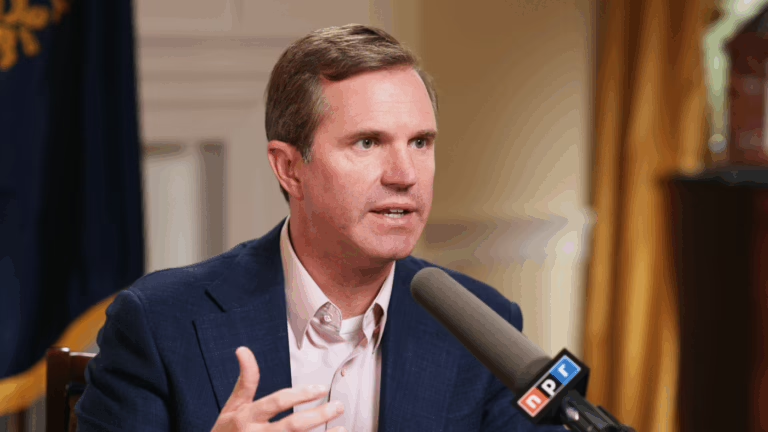Andy Beshear, a Democrat, has successfully secured the governorship of Kentucky twice, a notable achievement in a state that has favored Donald Trump in three consecutive presidential elections.
Now contemplating a presidential bid, Beshear shared his insights on the changes he believes the Democratic Party must embrace during an extensive NPR interview, which featured a video segment, a dedicated podcast episode, and coverage on the Up First podcast and Morning Edition.
While Beshear’s national recognition may not rival that of California Governor Gavin Newsom or other prominent figures like JB Pritzker, Pete Buttigieg, and Alexandria Ocasio-Cortez-who have also appeared in NPR’s interview series-he brings a unique advantage: winning statewide elections in a predominantly Republican state. At 47 years old, he represents a fresh face in a party eager for new leadership.
Kentucky’s Republican leaders often attribute Beshear’s victories to his family legacy-his father was a well-liked former governor-and the timing of his wins in 2019 and 2023, both off-cycle election years when many Trump supporters were less motivated to vote. Nevertheless, Beshear earned praise for his management of the COVID-19 crisis and response to several natural disasters. A significant portion of our conversation focused on strategies for Democrats to enhance their appeal among rural and conservative voters.
You can watch the full interview above. Below are some key takeaways:
Beshear holds Trump accountable for fallout from the government shutdown
Addressing the president’s threat to permanently dismiss federal workers as leverage against Democrats, Beshear emphasized, “If people are fired, it’s because the president chooses to do so-not because Democrats refused to negotiate. Federal employees are not bargaining chips or props, yet that’s how these families are being treated.”
While some analysts argue that Democrats embraced the shutdown as a last resort to block Trump’s agenda, Beshear clarified his support was rooted in defending a critical issue affecting millions: the continuation of Obamacare subsidies set to expire later this year.
Advocating for a Democratic nominee from a conservative state
Though Beshear has been a vocal critic of Trump-labeling his recent speech to military leaders as “un-American”-he noted that political tensions in Kentucky have somewhat eased, with many voters open to supporting candidates from either party.
Winning votes through genuine respect
Beshear’s electoral success in a socially conservative state has not gone unnoticed by Republicans, who have challenged him on issues such as transgender youth care. Prior to the 2023 election, the state legislature passed a law restricting such care, anticipating that Beshear’s veto would fuel negative campaign ads. “I vetoed it because it was the right decision,” he said. “My faith teaches me that every child is a child of God, and I refused to allow these kids to be marginalized.” He believes that openly communicating his motivations fosters respect among voters.
Reclaiming states through strategic investment
In 2008, Democrats held Senate seats in numerous rural and traditionally red states, from Montana to Arkansas to North Carolina, and even secured victories in Iowa and Indiana during Barack Obama’s presidential campaign. Today, the party faces challenges in envisioning a 51-seat Senate majority, with the upcoming electoral map presenting similar hurdles.
“The Democratic Party must commit resources,” Beshear asserted, using his own success as evidence that victories in unexpected regions are possible. “Democrats can reconnect with rural voters, especially given current circumstances. But the party needs to embody common sense, seek common ground, and focus on delivering results-addressing issues that affect every American.”
This radio segment was produced and edited by Adam Bearne and Reena Advani, with digital editing by Majd Al-Waheidi.

















